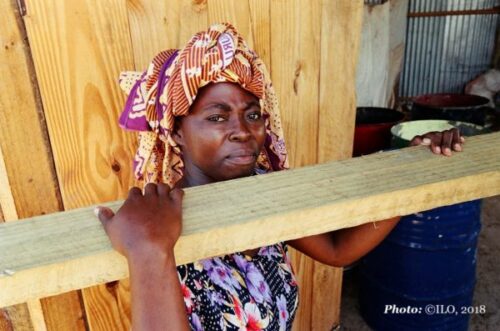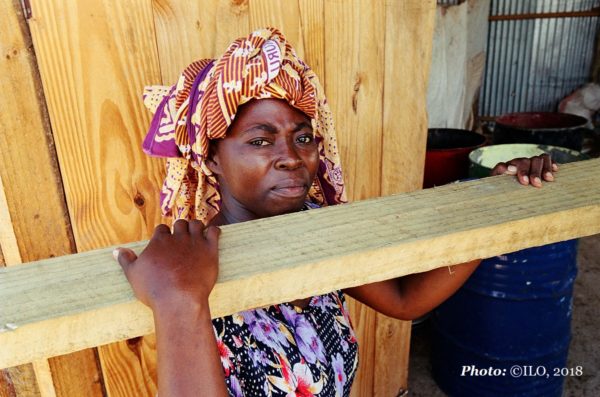Can we create better jobs in Africa’s booming construction sector?

ILO-The Lab compares constraints and opportunities in the building construction sector in Mozambique, Zambia and Rwanda
By Steve Hartrich and Elisa Mandelli, the Lab Project
If you take a stroll through Kigali, Rwanda, chances are you won’t wander long before stumbling across scaffolding, cement blocks, excavated soil, hard hats and shovels. What’s evident in a walk-through of Kigali is obvious to most of the three billion urban dwellers in Sub-Saharan Africa and South and East Asia: building construction is booming, and city landscapes are changing in the blink of an eye.
However, while some contractors have found riches over the past few years, the sector generally has not provided as favourably for the overwhelming majority of its workforce. The poor and vulnerable often gravitate toward temporary, high-risk, physically demanding and poorly paid work on construction sites. They shovel dirt, push wheelbarrows, relay stone blocks back and forth, and often don’t know if they’ll have a job in a month’s time let alone receive a pay check for the work they’ve done already. They also have limited opportunity to upskill and transition into higher paid, more stable, less demanding trades – often resigned to moving from site to site, living week-to-week and chasing short-term contracts which they hope can support survival at home. Simply put, job quality in building construction is poor.
With a building boom on one hand and a poor and vulnerable workforce on the other, building construction will surely become more relevant for development practitioners in the near future. So how can donors and development actors deliver projects that substantially improve the lives of the sector’s most vulnerable? The Lab – a knowledge generation project focused on how the market systems development approach addresses decent work outcomes – has analysed the building construction market systems in Mozambique, Zambia and Rwanda, and has discovered some common factors related to its potential challenges, constraints and opportunities, which are outlined in a short brief.
What do we know about building construction in Africa?
As part of this analysis, the Lab has examined how key constraints influence the building construction sector and the business and workers that operate within in it. Some key factors include:
- Finance makes the world go around. Access to finance and contract guarantees limits local contractors’ participation in the public procurement space and ultimately influences job quality and enterprise growth.
- A universal need for skilled workers. The lack of skills is a key constraint as contractors often have challenges in sourcing qualified, specialised tradespeople (e.g. painters) – sometimes going as far as bussing them in from neighbouring countries.
- Procuring poor jobs and slow MSME growth. Poorly oriented and low-quality national skills development programmes as well as limited incentive for workers and contractors to invest in their skills improvement complete the picture.
- High level of informality. Construction is often built by workers in precarious conditions as project contracts depend on variable client demand and requires different skills for different phases of the construction.
Finding the opportunities amid the sector complexity
Based on some of these challenges, the Lab has identified real opportunities for practitioners and donors to deliver benefits in a sector that is relatively new for the development community. Some of the opportunities lie in enhancing skills development to facilitate a transition to better jobs but also in improving the rules and regulation that govern contractor investment into job quality.
As opportunities are context specific, projects should use solid analysis to better understand the challenges and in turn, find the opportunities that can strengthen business and government incentives to invest in better jobs. Such analysis should dive head first into understanding current market structures and competitive pressure for contractors as well as factors that attract and keep workers in vulnerable jobs. It should also look to understand how the sector’s supporting services, especially finance and skills development, and rules and regulations impact contractor and worker decisions.
Building construction is a complex sector with challenges that can seem insurmountable, but development projects do have opportunities to deliver long-lasting benefits to those that need them most. This brief looks at how the lessons from market system analyses can help development practitioners more quickly hone in on and understand the challenges in a complex and increasingly relevant sector. Additional information on country-specific constraints and opportunities in the building construction sector can be found in three market system analyses prepared by the Lab for Mozambique, Zambia and Rwanda. For any feedback, comments, contributions or expression of interest, don’t hesitate to get in touch with us at thelab@ilo.org!

